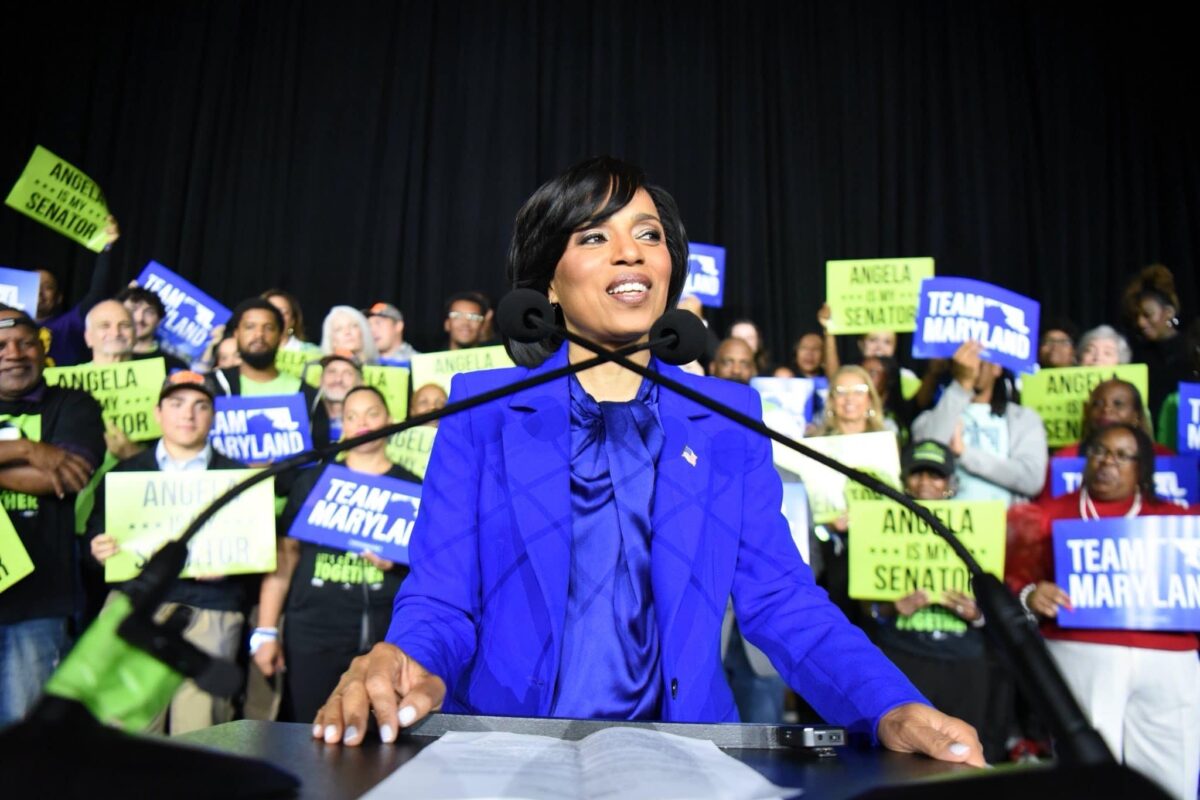
Prince George’s County Executive Angela Alsobrooks, 53, made history Tuesday night, becoming the first Black U.S. Senator elected from Maryland.
Despite unusually high stakes for a Maryland U.S. Senate race—former two-term Republican Governor Larry Hogan posed a viable challenge to the normally dependable Democratic seat—Alsobrooks will become one of just a handful of Black women ever to serve in the Upper Chamber.
Entering the election, Democrats held a 51-49 advantage in the Upper Chamber, including independent senators who caucus with Democrats. Hogan, 68, who previously said he had no interest in the Senate, was recruited to run by Kentucky Sen. Mitch McConnell, the longtime GOP Senate leader, in hopes of reclaiming the chamber.
With control of the U.S. Senate on the line, as well as national reproductive rights, Alsobrooks led in the polls consistently throughout the campaign, with the last poll from the University of Maryland and YouGov giving her an almost 14-point margin. According to last official tally Tuesday evening, Alsobrooks ultimately won by a smaller, but still significant margin, defeating Hogan 52.1 percent to 45.23 percent. National Democratic political stars who came out in support of Alsobrooks included former President Barack Obama and Vice President Kamala Harris, who lost the presidential contest to former and now President-elect Donald Trump.
That same Maryland and YouGov poll found Vice President Kamala Harris with a 26-point margin over former President Donald Trump in Maryland. According to last official tally Tuesday evening, Harris, a Howard University alum, defeated Trump in Maryland 59.7 percent to 37 percent, earning the state’s 10 electoral college votes.
Nationally, in what had been projected as a dead heat, former President Trump won the key battleground state of Pennsylvania, among others, on his way to what is expected to be solid victories in both electoral college and popular votes.
In a tweet early election day, UMBC political science professor and pollster Mileah Kromer noted that investment in Alsobrooks’ campaign from donors and outside spending was necessary, and that Hogan was a formidable opponent, even in very blue Maryland. “Her campaign made control of the U.S. Senate a top-on-mind issue for voters,” Kromer wrote. “It was the message and the messenger.”
In nearby Delaware, Congresswoman Lisa Blunt Rochester won election to the U.S. Senate, becoming the state’s first Black representative and first woman to serve in the role. Together, Alsobrooks and Rochester become just the third and fourth Black women ever elected to the U.S. Senate and the first to serve at the same time.
In a congratulatory election night tweet, Maryland U.S. Senator Chris Van Hollen posted a photo of Alsobrooks joining him as a guest at the annual State of the Union address last year, adding that he was looking forward to working with her now as a partner in Washington, D.C.
As of Wednesday morning, the final makeup of the U.S. Senate is not yet official, but Republicans are projected to retake majority control of the Upper Chamber. Control of the U.S. House of Representatives remains up for grabs.
Locally, of the eight referendums on Baltimore City ballots, the two questions that received the most scrutiny (detailed below) split for and against. A third historic referendum involving full authority over the Baltimore City Police Department passed.
- Question F, which referred to the “Inner Harbor Park” that would rezone Harborplace and enable the construction of private dwellings, i.e. condominium towers, to replace the original twin pavilions—passed with roughly 60 percent of the tally. A vote against Question F would have prevented the zoning change and proposed construction of high-rise, private-residence buildings at Harborplace.
- Question H, which would amend the City Charter to reduce the number of Baltimore City Council districts, and thus elected representatives, from 14 to 8—was rejected by more than 62 percent of voters. That measure had been financed by Sinclair Inc. chairman and The Baltimore Sun owner David Smith. The vote against Question H maintains the current size and structure of the City Council.
- Question E, which would make the Baltimore Police Department, officially a state agency since before the Civil War, an agency of the Baltimore City Council—with full authority over the police commissioner—passed.
Meanwhile, in Baltimore County, a referendum to increase the size of the County Council by two members—nine total—offered with the hope that it would help diversify the Council, passed by a significant margin. Also in Baltimore County, a referendum to enshrine the county’s inspector general’s office, which had faced attacks by several local legislators, passed by a wide margin.
On state ballots, Marylanders also passed, by an overwhelming margin, a referendum to add a state constitutional amendment to protect reproductive freedom.
Additionally, with Rep. Dutch Ruppersberger and Rep. John Sarbanes’ retirements—as well as the vacancy created by David Trone’s unsuccessful Democratic primary bid for the Senate—several congressional seats opened this election cycle. Locally, in District 2, Baltimore County Executive Johnny Olszewski, a Democrat, handily defeated radio talk show host Kimberly Klacik, a Republican. In District 3, Democratic state senator Sarah Elfreth, 36, also handily defeated Republican lawyer Robert Steinberger to become the youngest woman elected from Maryland elected to Congress.
In the competition to replace Trone in the largely western Maryland 6th congressional district, Democratic lawyer and former U.S. Department of Commerce official April McClain Delaney leads Republican and longtime General Assembly representative Neil Parrott by several hundred votes in a race that remains too close to call.
In citywide races that were largely a formality given Baltimore’s overwhelming Democratic registration numbers, Mayor Brandon Scott became the first mayor to be reelected in two decades. City Councilmember Zeke Cohen, who defeated Democratic incumbent Nick Mosby in the primary, easily beat GOP candidate Emmanual Digman to become the next president of the City Council. City Comptroller Bill Henry ran unopposed.
